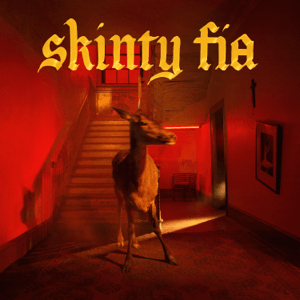 Released this year on the 2nd of April, Skinty Fia, the third album by the Irish band Fontaines D.C., is impassioned and sorrowful, a powerfully emotional collection of music sure to make an impact on the listener. The album’s title means “damnation of the deer”, which is an Irish phrase used often by the drummer’s great aunt.
Released this year on the 2nd of April, Skinty Fia, the third album by the Irish band Fontaines D.C., is impassioned and sorrowful, a powerfully emotional collection of music sure to make an impact on the listener. The album’s title means “damnation of the deer”, which is an Irish phrase used often by the drummer’s great aunt.
Save perhaps for “Big Shot”, Skinty Fia is a mostly vocally-driven album. There are instruments featured, certainly, but if anything, they serve mostly to emphasize the singing, rather than being the main draw of the song.
The first song on the album is “In ár gCroíthe go deo”, which takes its name from a phrase the English government banned from an old Irish woman’s gravestone. Despite the origin of its title, this track is not blatantly political, and yet it’s entirely possible that the lyrics of the song are meant to use the woman as symbolic of Ireland, with the country being the “only answer” and “only reason for feeling”.
The echoing effect in this song adds a sorrowful quality to it, whereas the drums add a fast energy. They combine to make a song that is both remorseful and impassioned, much like the rest of the album.
As mentioned earlier, “Big Shot” is probably the least vocally-driven song on the entire album. The instruments are the real emphasis here, but that’s not the only atypical element of this track, as it also feels much slower than the other songs. It’s not a bad song by any means, but it’s quite the black sheep among the other tracks.
“How Cold Love Is”, as you can probably guess from its title, laments a lack of love, and a general lack of intimacy. Originally, I guessed that this song was at least in some part about the coronavirus pandemic and its aftermath, especially given that this album was released earlier this year. But according to the band’s frontman, Grian Chatten, this song is apparently more about the impact that addiction has on families.
The lead song on the album, “Jackie Down the Line” is about an all-around villainous character. The song seems to center around Jackie’s abuse of a woman named “Sally. The song’s refrain warns us of what he’ll do to her (“I’ll wear you down in time”), which eventually renders her down into such a poor state that the vocalist invites the listener to “come on down to Sally’s boneyard.”
In a later verse, Jackie justifies himself in a way, which only makes him less sympathetic. “What good is happiness to me if I’ve to wear it carefully?” he asks, essentially implying that human decency is simply too much effort for him.
“Roman Holiday’‘ is certainly cheerful in both its energy and lyrics, at least as compared to the rest of the album. However, as it is still a part of the album of course, it’s not exempt from dark elements, featuring such lyrics as “While they’re snuffing out hopes, and they’re blotting out suns.” It actually has a much more upbeat tune than the other songs on the album, and it also features the guitar much more heavily than other tracks. The vocals still take overall precedence here, but the guitar is emphasized over the drums.
“The Couple Across the Way” is notably folksy. The vocals are sung much softer and slower than normal, and the guitar is played in such a way that I thought at first it was an accordion. This track is melancholic in tone, but not in the same intense way as the rest of the album.
The album’s title track comes right after “The Couple Across the Way”, and it serves as a more modern alternative to its predecessor. This is heard especially in its opening, which is a sort of instrumental grinding, and in the ending, where the singer’s voice is clearly and recognizably amplified artificially. “Skinty Fia” is also probably my favorite song on the album, and it absolutely lives up to the role of namesake.
Overall, I highly recommend this album. These are all good songs, and of course, you can’t experience them fully without listening to them yourself.
Luckily, it’s not a hard album to find, as it can be streamed now on Spotify and YouTube. And if you enjoy Skinty Fia, you should also check out Fontaines D.C.’s previous albums, Dogrel and A Hero’s Death.












